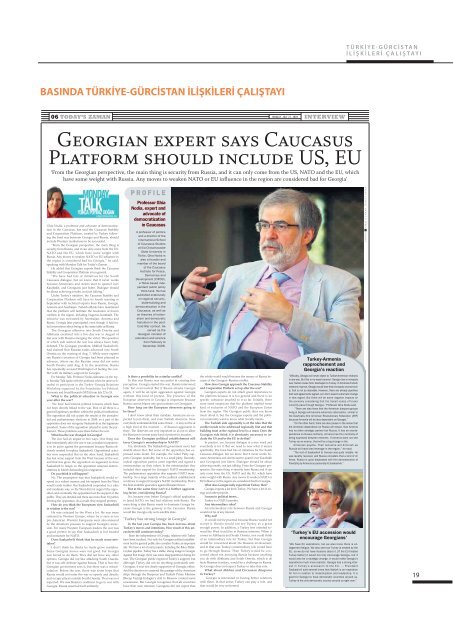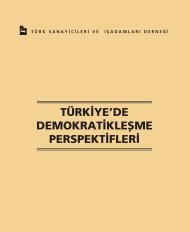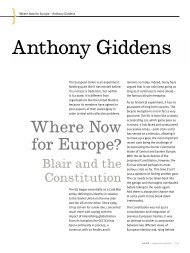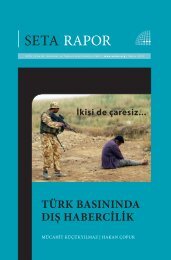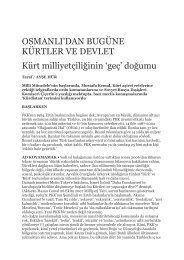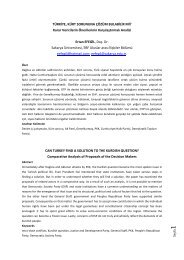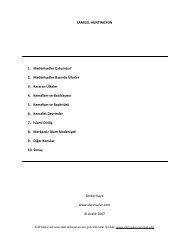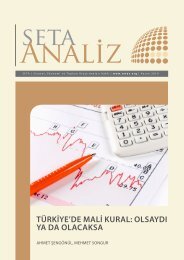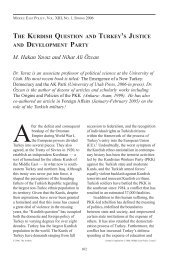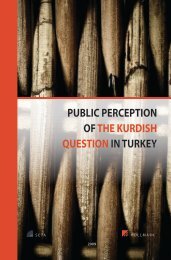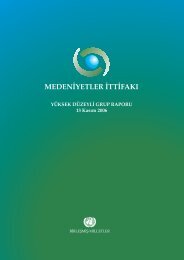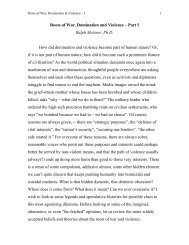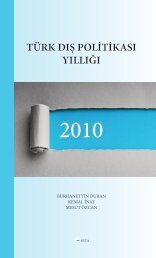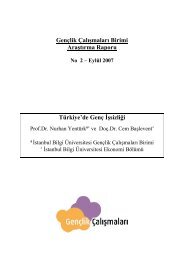türkiye-gürcistan ilişkileri çalıştayı raporu - SETA
türkiye-gürcistan ilişkileri çalıştayı raporu - SETA
türkiye-gürcistan ilişkileri çalıştayı raporu - SETA
Create successful ePaper yourself
Turn your PDF publications into a flip-book with our unique Google optimized e-Paper software.
TÜRKİYE-GÜRCİSTAN<br />
İLİŞKİLERİ ÇALIŞTAYI<br />
BASINDA TÜRKİYE-GÜRCİSTAN İLİŞKİLERİ ÇALIŞTAYI<br />
T06-27-07-09.qxd 26.07.2009 16:48 Page 1<br />
06 TODAY’S ZAMAN MONDAY, JULY 27, 2009 INTERVIEW<br />
Georgýan expert says Caucasus<br />
Platform should ýnclude US, EU<br />
‘From the Georgian perspective, the main thing is security from Russia, and it can only come from the US, NATO and the EU, which<br />
have some weight with Russia. Any moves to weaken NATO or EU influence in the region are considered bad for Georgia’<br />
Ghia Nodia, a professor and advocate of democratization<br />
in the Caucasus, has said the Caucasus Stability<br />
and Cooperation Platform, created by Turkey following<br />
the brief war between Georgia and Russia, should<br />
include Western institutions to be successful.<br />
“From the Georgian perspective, the main thing is<br />
security from Russia, and it can only come from the US,<br />
NATO and the EU, which have some weight with<br />
Russia. Any moves to weaken NATO or EU influence in<br />
the region is considered bad for Georgia,” he said,<br />
speaking with Monday Talk for Today's Zaman.<br />
He added that Georgian experts think the Caucasus<br />
Stability and Cooperation Platform is too general.<br />
“We have had lots of initiatives for the South<br />
Caucasus dialogue, but we know that it never works<br />
because Armenians and Azeris start to quarrel over<br />
Karabakh, and Georgians just listen. Dialogue should<br />
be about achieving results, not just talking.”<br />
Under Turkey's initiative, the Caucasus Stability and<br />
Cooperation Platform will have its fourth meeting in<br />
September with technical experts from Russia, Georgia,<br />
Armenia and Azerbaijan. Turkish officials have maintained<br />
that the platform will facilitate the resolution of frozen<br />
conflicts in the region, including Nagorno-Karabakh. The<br />
initiative was welcomed by Azerbaijan, Armenia and<br />
Russia. Georgia later participated, even though it had initial<br />
reservations about being at the same table as Russia.<br />
The Georgian offensive into South Ossetia and<br />
Abkhazia escalated into a five-day war in August of<br />
last year with Russia emerging the victor. The question<br />
of which side started the war has always been hotly<br />
debated. The Georgian president, Mikhail Saakashvili,<br />
had claimed that Russian tanks advanced into South<br />
Ossetia on the evening of Aug. 7. While some experts<br />
say Russia's invasion of Georgia had been planned in<br />
advance, others say the Russian army did not enter<br />
South Ossetia until Aug. 8. In the meantime, Russia<br />
has repeatedly accused Washington of fueling the conflict<br />
with its military support for Georgia.<br />
For Monday Talk, Professor Nodia elaborates on the topic.<br />
Monday Talk spoke with the professor when he came to Ýstanbul<br />
to participate in the Turkey-Georgia Relations<br />
Workshop organized by the Foundation for Political,<br />
Economic and Social Research (<strong>SETA</strong>) from July 22 to 24.<br />
What is the political situation in Georgia one<br />
year after the war?<br />
We have had internal political tensions which have<br />
not been directly linked to the war. First of all there is a<br />
general legitimacy problem within the political institutions.<br />
The opposition did not accept the results of the presidential<br />
and parliamentary elections in 2008, so a part of the<br />
opposition does not recognize Saakashvili as the legitimate<br />
president. Some of the opposition refused to enter the parliament.<br />
Those problems were there before the war.<br />
What has the war changed in Georgia?<br />
The war had an impact in two ways. One thing was<br />
that immediately after the war it was considered unpatriotic<br />
to be active against the government because Russia obviously<br />
wanted to replace Saakashvili. Oppositional activities<br />
were suspended. But on the other hand, Saakashvili<br />
has lost some support from the West because of the war,<br />
and that has given the opposition an argument to force<br />
Saakashvili to resign, so the opposition resumed demonstrations<br />
in March demanding his resignation.<br />
Do you think it will happen?<br />
No. The assumption was that Saakashvili would respond<br />
in a violent manner and his support from the West<br />
would erode further. But Saakashvili responded in a calm<br />
and moderate way, so the West did not support the opposition<br />
and eventually the opposition lost the support of the<br />
public. They are divided and there are more than 10 parties<br />
forming the opposition. As a result, they stopped protests.<br />
How do you think the Europeans view Saakashvili<br />
in relation to the war?<br />
He was criticized by the West a lot. He was more<br />
criticized in Western Europe, where he is seen as too<br />
pro-American. Western Europeans were also annoyed<br />
by the American pressure to support Georgia's accession.<br />
For many Western European leaders the war was<br />
a good pretext to say that Saakashvili is hot headed<br />
and immature for NATO.<br />
Does Saakashvili think that he made some mistakes?<br />
I don't think he thinks he made grave mistakes.<br />
Some Georgian moves were not good, but Georgia<br />
was forced to do them. They did not have any other<br />
options. Georgia did not like attacking South Ossetia,<br />
but it was self-defense against Russia. That is how the<br />
Georgian government sees it, but there was a miscalculation.<br />
Before the war, there was some hope that<br />
Russia would not enter the war so openly and directly<br />
and occupy places outside South Ossetia. That was not<br />
expected. We saw Russia's readiness to go to war with<br />
Georgia. Russia asserted itself militarily.<br />
PROFILE<br />
Professor Ghia<br />
Nodia, expert and<br />
advocate of<br />
democratization<br />
in Caucasus<br />
A professor of politics<br />
and a director of the<br />
International School<br />
of Caucasus Studies<br />
at Ilia Chavchavadze<br />
State University in<br />
Tbilisi, Ghia Nodia is<br />
also a founder and<br />
member of the board<br />
of the Caucasus<br />
Institute for Peace,<br />
Democracy and<br />
Development (CIPDD),<br />
a Tbilisi-based independent<br />
public policy<br />
think tank. He has<br />
published extensively<br />
on regional security,<br />
state-building and<br />
democratization in the<br />
Caucasus, as well as<br />
on theories of nationalism<br />
and democratic<br />
transition in the post-<br />
Cold War context. He<br />
served as the<br />
Georgian minister of<br />
education and science<br />
from February to<br />
December 2008.<br />
Is there a possibility for a similar conflict?<br />
In this war Russia was successful in creating this<br />
perception: Georgia started the war, Russia intervened<br />
later but overreacted. But if Russia attacks Georgia<br />
again, it will be an open aggression against Georgia<br />
without this kind of pretext. The presence of the<br />
European observers in Georgia is important because<br />
Russia cannot blame any provocations on Georgians.<br />
How long are the European observers going to<br />
be there?<br />
I don't know about their mandate. Americans are expected<br />
to join them, and even Turkish observers. Now<br />
everybody understands that some threat -- it may not be at<br />
a high level at the moment -- of Russian aggression is<br />
there. The observers are very important so as not to allow<br />
the Russians to invent some kind of pretext for invasion.<br />
Does the Georgian political establishment still<br />
favor Georgia's membership in NATO?<br />
Yes, absolutely. The Saakashvili government never had<br />
doubts about that. But some of the opposition has expressed<br />
some doubt. For example, the Labor Party supports<br />
Georgian neutrality, but it is a small party. Recently,<br />
radical opposition parties came together and signed a<br />
memorandum on their values. In the memorandum they<br />
included their support for Georgia's NATO membership.<br />
The parliamentary opposition also supports NATO membership.<br />
So a large majority of the political establishment<br />
continues to support Georgia's NATO membership. That's<br />
the best available guarantee against Russian threat.<br />
But at the same time isn't it a further aggravating<br />
factor, considering Russia?<br />
No, because even before Georgia's official application<br />
to [join] NATO, we had bad relations with Russia. The<br />
main thing is that Russia wants to dominate Georgia because<br />
Georgia is the gateway to the Caucasus. Russia<br />
would like Georgia only as its satellite state.<br />
‘Turkey has strong image in Georgia’<br />
In the last year Georgia has been nervous about<br />
Turkey's moves and intentions. How much of this uneasiness<br />
still continues today?<br />
Since the independence of Georgia, relations with Turkey<br />
have been excellent. Not only the Georgian political establishment<br />
but the general public also considers Turkey an important<br />
ally. We have a lot of joint projects, including the Baku-Tbilisi-<br />
Ceyhan pipeline. Turkey has a stable, strong image in Georgia.<br />
Against that image, there was some disappointment during the<br />
war. The Georgian public expected Turkey's support, but<br />
although Turkey did not do anything particularly anti-<br />
Georgian, it was not clearly supportive of Georgia, either.<br />
And the decision to suspend the passage of the American<br />
ships through the Bosporus and Turkish Prime Minister<br />
[Recep Tayyip] Erdoðan's visit to Moscow created some<br />
uneasiness. But Georgia recognizes that all countries<br />
have their own interests. Georgians did not expect that<br />
the whole world would become the enemy of Russia because<br />
of the Georgian-Russian conflict.<br />
How does Georgia approach the Caucasus Stability<br />
and Cooperation Platform set up after the war?<br />
Georgian experts do not attach great importance to<br />
the platform because it is too general and there is no<br />
specific substance attached to it so far. Initially, there<br />
were some suspicions that the platform implied some<br />
kind of exclusion of NATO and the European Union<br />
from the region. The Georgian public does not know<br />
much about it, but the Georgian experts and the political<br />
community want to know what it really means.<br />
The Turkish side apparently is of the idea that the<br />
conflict needs to be addressed regionally first and that<br />
building trust at the regional level is a must. Does the<br />
Georgian side think it is absolutely necessary to include<br />
the US and/or the EU to do that?<br />
In practice, yes, because dialogue is a nice word and<br />
everybody is for it. But we need to now what it means<br />
specifically. We have had lots of initiatives for the South<br />
Caucasus dialogue, but we know that it never works because<br />
Armenians and Azeris start to quarrel over Karabakh<br />
and Georgians just listen. Dialogue should be about<br />
achieving results, not just talking. From the Georgian perspective,<br />
the main thing is security from Russia and it can<br />
only come from the US, NATO and the EU, which have<br />
some weight with Russia. Any moves to weaken NATO or<br />
EU influence in the region are considered bad for Georgia.<br />
What does Georgia really expect from Turkey, then?<br />
Georgia expects a lot from Turkey. We have a lot of energy<br />
and other projects.<br />
I mean in political terms…<br />
Turkey is a NATO member.<br />
Any intermediary roles?<br />
An intermediary role between Russia and Georgia<br />
would not be of any interest.<br />
Why not?<br />
It would not be practical because Russia would not<br />
accept it. Russia would not see Turkey as a great<br />
enough power. In addition, a Turkey less oriented toward<br />
the West would be in Russian interests. When it<br />
comes to Abkhazia and South Ossetia, one could think<br />
of an intermediary role for Turkey, but then Georgia<br />
would be concerned about the Russian involvement,<br />
and in that case Turkey's intermediary role would have<br />
to go through Russia. Then Turkey would be concerned<br />
about not annoying Russia because anything<br />
you do with Abkhazia and South Ossetia, which is de<br />
facto Russian territory, would be a challenge to Russia.<br />
So Georgia does not expect Turkey to take that role.<br />
What about Abkhaz and Circassian diasporas<br />
in Turkey?<br />
Georgia is interested in having better relations<br />
with them. In that sense, Turkey can play a role, and<br />
that would be very welcomed.<br />
Turkey-Armenia<br />
rapprochement and<br />
Georgia's reaction<br />
“Officially, Georgia will never object to Turkish-Armenian relations<br />
in any way. But this is my expert opinion: Georgia has a monopoly<br />
over transit routes from Azerbaijan to Turkey. If Armenian-Turkish<br />
relations improve, Georgia would lose that monopoly; economically,<br />
that is not so desirable. However, there are already pipelines<br />
built and agreements signed, so I don't expect a dramatic change<br />
in that regard. But there will be some negative impacts on<br />
the economy considering that the transit routes of trucks<br />
currently pass through Georgia,” Professor Ghia Nodia said.<br />
“There are also fears that the Armenian diaspora groups<br />
living in Georgia will become extremely nationalistic, similar to<br />
the Dashnaks [the Armenian Revolutionary Federation [ARF]<br />
because Armenia will be less dependent on Georgia.”<br />
“On the other hand, there are also pluses in the sense that<br />
the Armenian dependence on Russia will reduce. Now Armenia<br />
has no other strategic partner but Russia. It has an overdependence<br />
on Russia militarily. Armenia has this mentality of<br />
being squeezed between enemies. If Armenia does not see<br />
Turkey as an enemy, that will be a big change in the<br />
Armenian psyche. Then tensions will diminish as<br />
Russia will have less leverage in the region,” he said.<br />
“The visit of Saakashvili to Yerevan was quite notable. He<br />
was lavishly received, and Russia considers that a kind of offense.<br />
Russia is quite displeased with this demonstration of<br />
friendship by Armenia so personally to Saakashvili.”<br />
‘Turkey's EU accession would<br />
encourage Georgians'<br />
“We have EU aspirations, but we also know there is enlargement<br />
fatigue. We also see how Turkey is treated by the<br />
EU, so we do not have illusions about it. [If the EU treated<br />
Turkey better] it would not only encourage Georgia, but it<br />
would also be a strategic change. It would make Georgia's<br />
aspirations much more realistic. Georgia has a strong interest<br />
in Turkey's accession to the EU. … President<br />
Saakashvili said several times that Atatürk is an inspiration<br />
for him in relation to modernization and leadership. It is<br />
good for Georgia to have democratic countries around us.<br />
Turkey is the only democratic country around us right now.”<br />
P H O T O S T O D A Y ’ S Z A M A N , T U R G U T E N G Ý N<br />
19<br />
CM Y K


